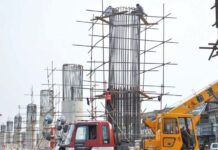
Shopping malls are empty, consumer businesses are reporting losses in double digits, people are losing jobs while new ones are not available, and new investment is not happening. This is not a downturn in the economy. It is merely the culmination of amateur hour in policymaking that international donors and the bureaucracy have combined to develop for decades.
The thirst for taxation has driven the economy to the ground. Economic activity is now gasping for air.
Decades of research has clarified the principles of taxation, which are:
- A tax system must be simple and clear.
- It should not seek to tax different goods and services differently to allow all consumer and investment decisions to be based on market realities.
- Tax rates and policies should be stable and not changing in mini-budgets every few months forcing all to speculate on tax policy.
Tax administration is a collection agency, not an intrusive and oppressive bully using the power of collection to ruin your life as well as extract rents from you. Systems are used to stop anyone from cheating the government including the tax man. The tax man is not allowed to treat the citizens as thieves and bully them into submission or bribery.
In the last 40 years, the Ministry of Finance and Federal Board of Revenue (FBR) have spurned these principles and have sought taxation like the medieval tax farmers that kept their populations in perpetual deprivation. They tax whatever they can see arbitrarily. They call indirect taxes withheld income taxes with the full intention of never returning the withheld tax. They nurture the narrative of tax thieves for their countrymen to cover up their incompetence and venality.
The FBR collects little tax itself, having farmed out tax collection to withholding agents, banks, utilities, schools, telecom companies, etc. Yet it has wide-ranging powers with no accountability.
As in medieval times, in modern Pakistan, those engaged in trade, entrepreneurship and economic activity spent real time, resources and effort to hide from this predatory and thoughtless government. In Pakistan, the informal market grew similarly, not as thieves’ or smugglers but as people looking to make a life for themselves beyond intrusive tax faming.
Thanks to large-scale migration of people from rural areas to urban centers, the middle classes grew in every corner of Pakistan over the last 40 years. Government policy impeded that growth, but the enterprise of the migrants and their families generated wealth and commerce everywhere. Land values went up as the dispossessed now found wealth to buy a house and perhaps set up a shop.
This informal economy grew to provide the “tax hunters” — international donors, the finance ministry, the FBR, and their followers— with more excuses for predatory taxation. They raised the specter of documentation and an apartheid between the filers and the non-filers. The poor migrants, building a life from a high propensity to save, are considered thieves and precluded from accumulating wealth by an uninformed and thoughtless policy.
The finance ministry and the FBR have virtually waged war against the small saver who is saving in real estate and the small trader who is making a living by setting up a small business for the last decade or so. Their allies in this fight are the big industrialists who were raised under licenses and subsidies, then thrived on state protection and bureaucratic favors such as tax exemptions and favorable input prices and sovereign guarantees.
The upshot of all these policies is that the state is now taxing all manner of transactions arbitrarily while also imposing huge documentation costs. Real estate has been particularly singled out to virtually stop all transactions.
Migrants and small savers have for decades bought plots in housing schemes that the state promoted over the last five decades. Development was delayed by decades as collusion between regulator and developer defrauded investors on many levels. Thirty to forty years later, some of these schemes are maturing, not because of any effort by either the regulator or developer. The natural urbanization process made these properties valuable.
The government is now busy maligning this investment as thieving and informal. Without evidence, all the government wants to do it tap into the capital gains of small savers that have taken decades to mature. No apologies for the failure of regulation, for the failure of courts to guard contracts, and no punishment for malfeasant developers. Instead, the government is busy abusing savers and cheating them out of gains that they waited decades for.
Similarly, people who have attempted to set up a small business are forced out of business by government policy or asked to contribute way more than they earn. Any entrepreneur rising out of poverty has to face the calumny of the state be being called ‘informal’, another word for thief.
For example, Hafeez Center, a shopping plaza in Lahore, is full of clever entrepreneurs who adapt to market needs by providing software, computers, mobile phones, etc. Most of them are small shopkeepers with shops with a floor area of less than 100 square feet. Their business has dried up with the recent push against the import of mobile phones into the country as well as more harsh checks on the informal economy.
There are many such centers for small entrepreneurs in every city. I recently checked some of them in Lahore and they are hurting for business.
The prime minister is now saying that making money is a good thing and the rich should get richer. Why then are those who are lifting their heads out of poverty being called names and targeted?
The government and its advisers need to change their analysis and make it more evidence based. Here are three things that they need to:
- First, they must understand that an economy is a set of transactions and more transactions means higher economic growth.
- Second, it is a fallacy to think that the government knows which transactions are better.
- Third, taxing transactions beyond a simple general sales tax (GST) or value-added tax (VAT) is inefficient and counterproductive. It will kill transactions and slow down growth.
It is time that the government stopped making policy on rhetoric alone. There are no good and bad transactions. Nor is documentation a tax on transactions. The primary reason for much of the legal framework and government machinery is to facilitate transactions.
There is a clear need for the government of Pakistan to be a transaction-facilitating government rather than a transaction-blocking government. The economy is shrinking because of this policy of suspicion on all transactions. If the government wants to revive the economy, they should carefully review all policies to weed out those that are impeding transactions.
Policymakers should remember: kill transactions, kill economic growth.
Nadeemul Haque is a University of Chicago-trained economist who served as the former deputy chairman of the Planning Commission of Pakistan, the former vice chancellor of the Pakistan Institute of Development Economics, after having had a decades-long career as an economist at the International Monetary Fund.




















Spot on Dr. Nadeem. Could not agree more. But why cannot our planning gurus in finance and planning ministries and their friends in all sorts of bureaucracies ever see this ? they continue to treat this country like they want to see it aka usa and eu countries. Perhaps because our economic managers are more familiar and comfortable with those countries. Could it be that you cannot relate to the realities of Pakistan because you have never been exposed to them ? if the management class in pak has lived in their tiny cocoons most of their lives do we expect them to understand ground realities of the majority ? and if this is so why expect anything else but the undoing of the economy by the current government ?
I completely disagree. The US has one of the most complex and regulated codes, return (1040) is like a small booklet and rates are varying with many credits and tax expenditures. Same is the case with other developed countries like UK, Canada, Australia etc. On the other hand, you can pick up tax laws of countries like Malaysia, Turkey, Singapore etc. and you will not find Pakistani law or policies as less advanced. The problem is lack of tax culture and absence of deterrence. The structure of FBR is so pathetic and poorly developed that it cannot enforce its writ. And instead of making it strong, various Governments have weakened it with half-baked, random reforms. Naya Pakistan is not an exception. You have to equip your traffic constable with car and gadgets if you want observance of traffic laws. You cannot just give him a bike and expect him to chase violating fast cars .
Looks a logical analysis. People habitual of “freedom” like “property dealers” and so called “small traders” of ICT goods generate humongous amount of transactions outside net of economic registry. Now everyone needs to learn to live in a registered economy with recorded transaction.. it will be painful in the beginning
Not only do you have to provide the traffic warden with the appropriate gadgets, you need to provide a compliance framework to the small time dealers in the transaction to learn to abide by the law. You can abruptly ask a small time wholesaler to record his transaction in compliance with taxation when the person has never thought to do it before.
But tax enforcement authorities, especially provincial, local and at the lowest level must be well equipped, honest and of high-capability to transform SMEs and informal economy into vibrant and most productive sector of Pakistan economy. Only then it would be Naya Pakistan
policy is make for break
IN pakisktan policy maker is babu who even did not do business they earned money form bribe and commison mafia
if we want to collect tax wo first of all take trade union on stake and include business man on team who suggest and have worth to implement.
our excise and tax collector inspector hire on RS 35000 pay than how could you expect from it.?
most important people in sub conitnent did not pay tax forcefully give some incvtives like marketing company
It’s high time we studied and learned from VAT systems introduced in various economies (India being the most relevant to us). Avoiding pitfalls, We can adopt improved version of VAT with NADRA help to bring all “informal” transactions (no matter small or big) into the net of economic registry and revenue evaluation. Technologies like smart devices and big data are in hand to help.
It’s high time we studied and learned from VAT systems introduced in various economies (India being the most relevant to us). Avoiding pitfalls, We can adopt improved version of VAT with NADRA help to bring all “informal” transactions (no matter small or big) into the net of economic registry and revenue evaluation. Technologies like smart devices and big data/AI are at hand to help.
With all the qualifications and government positions, why didn’t you take action when empowered?
While some of the points are important, it is overall an academican’s point of view rather than on ground reality. There may be many transactions in the real estate but these do not increase overall productivity of the country. For that we need to first regulate the black economy which is currently being led by the real estate sector. The biggest parking of illegal money is the real estate sector which needs to be closely followed.
Economy should shot be allowed to be a laundering machine for black money. The biggest chunk of economy is parked and laundered in real estate. People’s I’ll gotten wealth, bribery, corruption is laundered through it. No economy book justifies the kind of stupendous real estate inflation this coubtrybhas seen. Go for the jugular and tax real estate heavily as you can. The small merchants etc should be allowed to run as they are already.
Comments are closed.